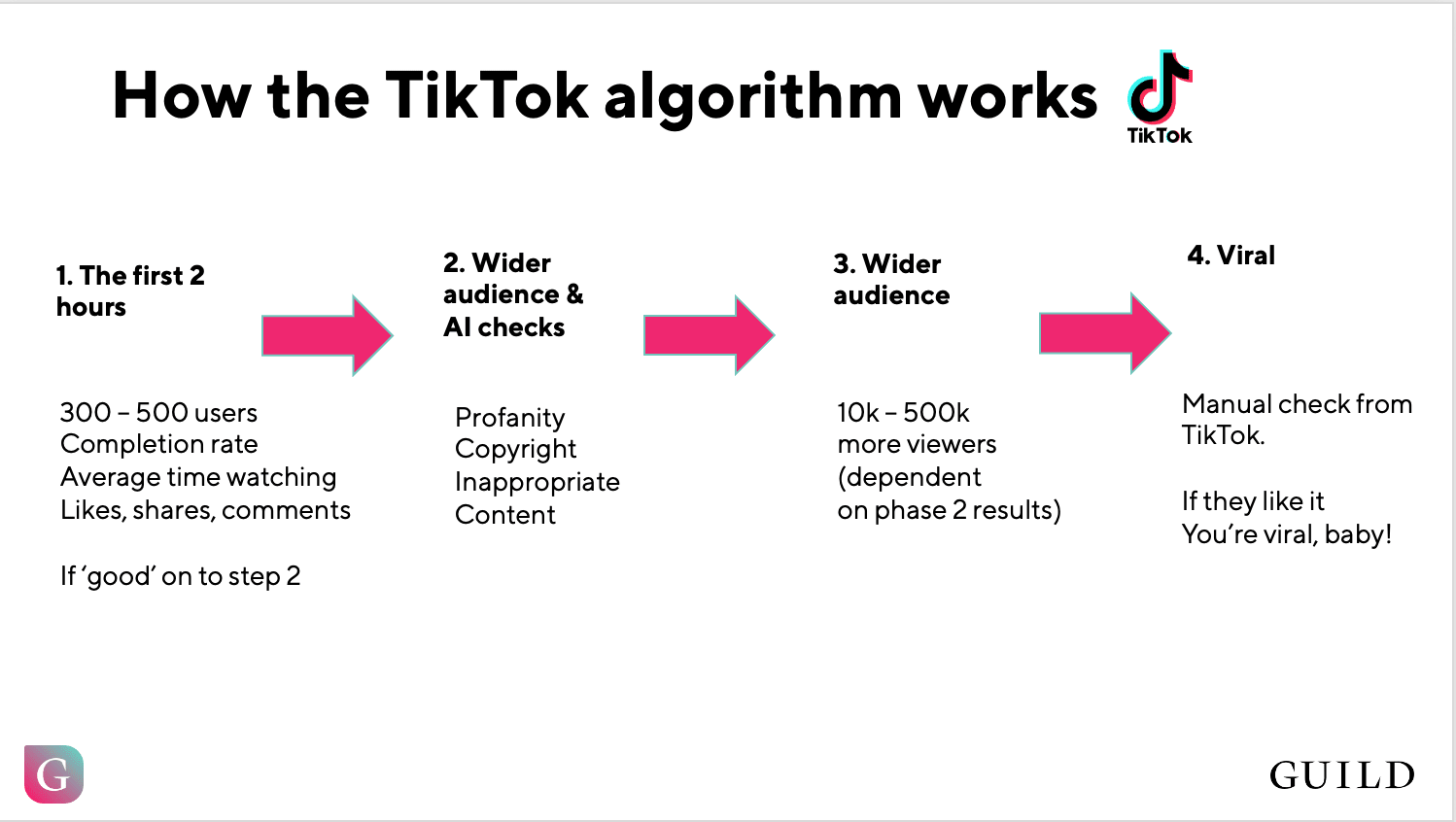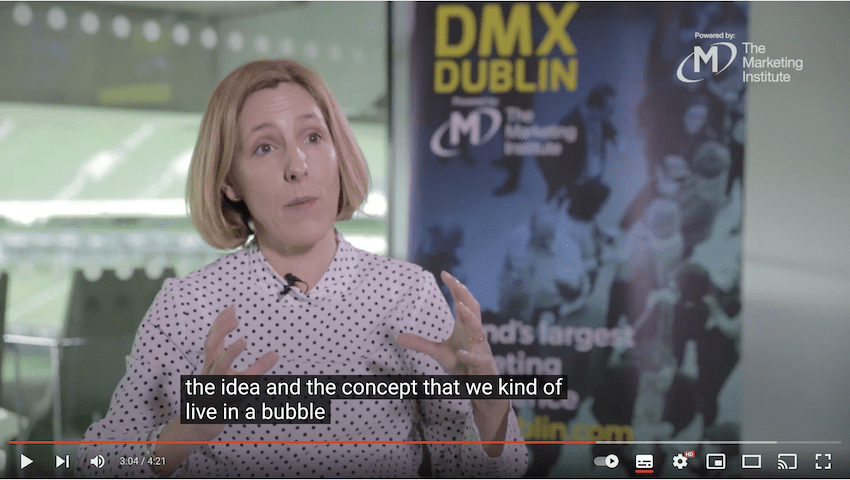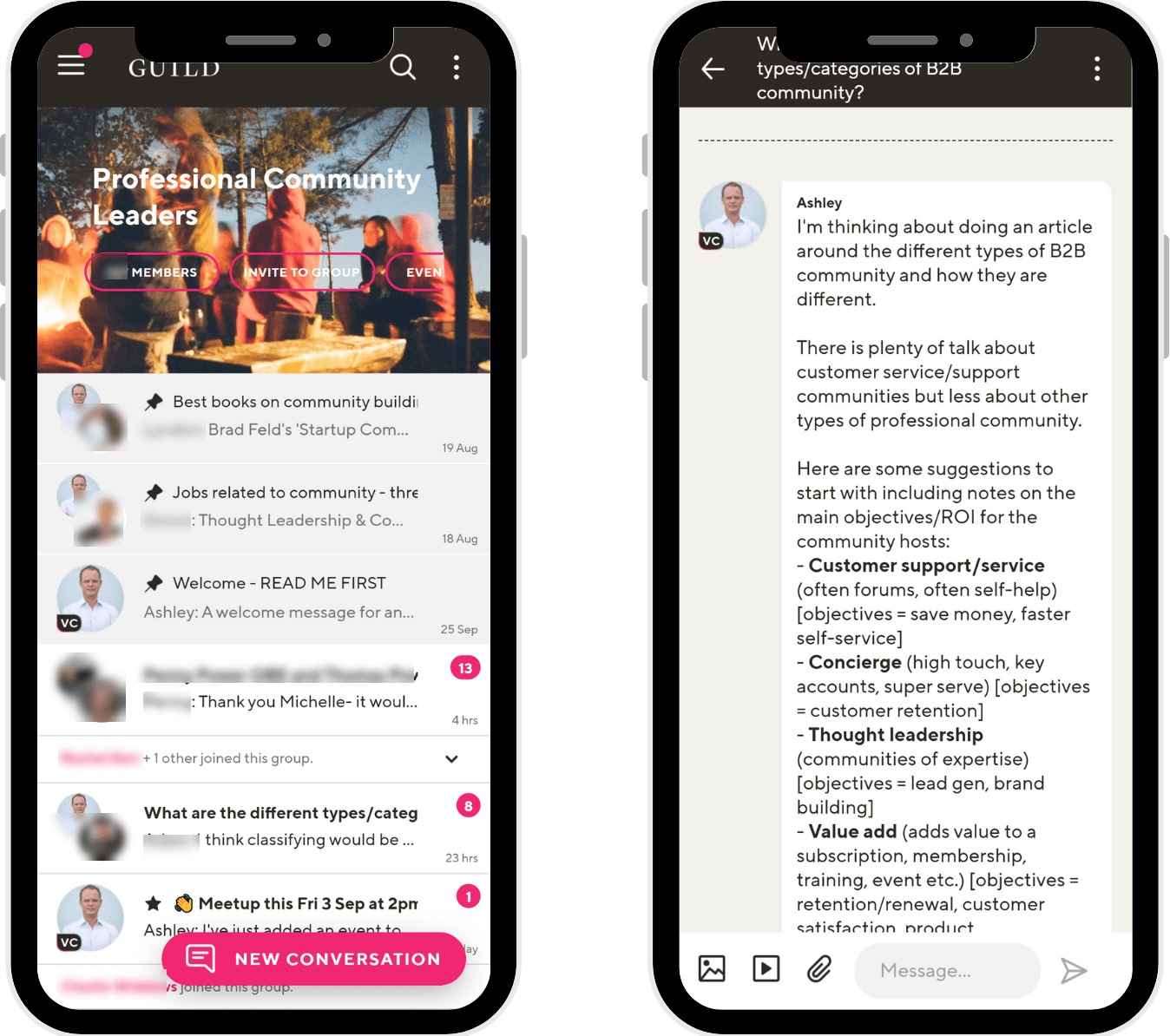Building your community on social media?
Then you may have come to the conclusion that social media algorithms are ruining your community.
Community strategists have long debated whether it makes sense to build a community on social media or not.
On the plus side, social media allows you to meet members in platforms where they’re already engaging at scale.
On the negative side, most community strategists don't recommend building a community on social media if you respect member data, want sustainability, longevity and value...and certainly not if you want community content and discussion to be visible rather than battling daily with social media algorithms.
What are social media algorithms?
Quite simply, Twitter, LinkedIn, Facebook, Instagram, TikTok and all ad-funded social media platforms determine which content to deliver to people in their 'feed' based on their behaviour.
Many years ago, you'd see something in your feed based on its publishing time, usually the newest posts first. But today, most social media, with the exception of TikTok, use a connection graph to determine what an individual sees in their Instagram, LinkedIn, Twitter or Facebook feed.
They all use algorithms to make a selection of what users get to see on the social media platform app by using data that has been collected by the platforms, based on a user's past use, and also data that users voluntarily give to platforms.
There are countless articles advising brands and creators how to 'beat the algorithm'. Some brands are successful at this, some are not. The rules change with each new feature or content format, but the simple truth is that the social media giants fully control what individual users see and experience on their platforms.

Diminishing visibility of brand content in social media
Brands are feeling it’s a struggle to get their content seen by the people they’re connected with on social media without resorting to 'engagement bait'.
A shift towards prioritising and promoting ‘high performing’ content that games the system forces brands to behave in certain ways to get visibility.
"More and more brands are having to rely on engagement bait tactics such as collaborations, trend jacking and memes just to be seen." explains Nexus' Head of Social Harry Gardiner.
"The most engaged brands online are the funny ones - so suddenly every business is rushing to develop a quirky personality for fear of becoming irrelevant, or worse, ignored. The irony is that by the time social media teams get sign off to react to trends, the memes are usually long overcooked."
Restless Comms Founder Chris Reed highlights the constant battle that those running communities in Facebook or LinkedIn face, whether they are using Groups or Pages:
“It seems that the ‘old’ social platforms which seemed to be well set up for groups just aren’t catering for them now - I’m an admin for a couple of Facebook groups and we’ve seen a noticeable decline in reach and engagement within both.
It certainly feels like there has been a number of significant changes to algorithms to suppress brand content visibility to those who have followed or joined.
Either way we’re actively looking at moving across to other platforms now. Both to maximise reach amongst a keen and opted-in audience, but also for better visibility of activity on the platform.”
Browser Media Account Director Vic Spall highlights the continual tweaks to the algorithm that specialist digital marketing agencies have to stay on top of on behalf of their clients:
"Social media platforms are constantly evolving, making it difficult to stay on top of every single change and tweak to the algorithm. While you may expect to see posts from those you follow and engage with most frequently, this isn't always the case.
Social media platforms are constantly pushing suggested content in a bid to show users posts they are more likely to interact with based on their behaviour, the behaviour of their friends, and similar accounts a user follows. And because feeds are no longer chronological, trying to predict the best times of day or day of the week to post has become almost impossible."
Alongside diminishing visibility for brands, the algorithmic impact on our daily social feeds can be negative for individuals in other ways.
As users, when we log on to social media platforms, we expect to see relevant content from people - friends and family we’re connected with – after all we connected for a reason.
Think about your Twitter feed. When was the last time that you saw more than a handful of the same people in your feed? And why do certain people seemingly disappear from Instagram, Facebook, Twitter and LinkedIn feeds even though you'd like to see their updates?
That's the algorithm at work.
Do social media algorithms encourage the wrong behaviours?
The problem with social media algorithms is that they favour certain styles of content and posts; incendiary Tweets designed to cause disagreement and division; LinkedIn posts with existential angst or pleas for help - the fabulous Twitter account The State of LinkedIn frequently features some of the very worst (anonymised) algorithm offenders.
In LinkedIn, valuable and informative professional content gets lost in a sea of marketing messages and long, broetry style posts with thousands of likes. Those with something valuable to say or share fail to cut through the noise and get their posts seen.
That's the algorithm at work.
This pressures others to attempt to mimic these patterns and types of post to stay visible on the platform.
Whilst some would suggest that algorithms are there to keep us coming back to social media platforms and they are a necessity, it's hard to not admit that algorithms encourage and reward the wrong kind of behaviours, not just in what we’re actively posting, but in what we interact with too.
Many people make a conscious effort to engage with this style of post that they wouldn’t ordinarily have an interest in, to try and manipulate their own visibility on the platform.
It’s also becoming more common for people to avoid linking out from the platform they’re in, in a bid to gain more impressions – even if doing so would provide their audience with useful information or context.
When we begin to make decisions that favour algorithms over interesting concepts, ideas or user experience, it’s clear something is wrong on social media.
And that’s why social media platforms aren’t always the best homes for communities. They have the benefit of being recognisable, but they incentivise the wrong actions.
Social media algorithms create 'filter bubbles'
I was interviewed by The Marketing Institute of Ireland at DMX Dublin in 2017 about some of the more challenging aspects of social media. I suggested that algorithms and programmatic advertising were creating a 'bubble' where individuals got fed more of the same thing based on past view/click/comment/search behaviours.
And that we were losing the serendipity and surprises that us early web users experienced before algorithms.

The Filter Bubble concept isn't new thinking. Author Eli Parser wrote 'The Filter Bubble - How The New Personalized Web Is Changing What We Read And How We Think' in 2012.
He made it clear that because news that we dislike or disagree with is automatically filtered out, it might have the effect of narrowing what we know.
I was lucky enough to speak to a group of 17-18 year olds recently about their use of TikTok, Instagram and Spotify. It seems that I'm not alone in feeling jaded by the constant stream of content in social media that has defined who I am.
The way these young adults described what they see in their feeds, what music or products are recommended to them and how they know their apps are profiling them was revealing.
They used the words and phrases ‘fattened', ‘seen’, 'designed to keep you addicted', 'reinforces who I am' etc.
Whilst no-one used the word 'serendipity', it does feel like some of the younger generation might rebel / opt out against the behavioural targeting/profiling that they know is happening if they are not surprised occasionally with something magical, something not based on their behaviours/likes and something completely left-field.
These are interesting considerations for brands, businesses and organisations who wish to target young adults.
Sue Llewellyn, social media consultant/trainer comments:
"One of the problems with the algorithms, is showing you more of what you like. Theoretically that sounds great, but it can mean your feed is dominated by posts from the same people or brands, which effectively blocks a broader range of content and ideas. It also means that sometimes you really have to consider whether to engage or not – particularly on Instagram for example.
The other difficulty is cutting through the noise and filtering your feed. On LinkedIn it’s impossible to really get a sense of what your whole network is doing. And it’s also stuffed with irrelevant adverts."
That's the algorithm at work.
An equal share of voice is important in online communities
Online communities are built on trust. Belonging to a safe space with people joined together by a common interest or expertise is an important part of both our professional and personal lives. Building relationships, sharing ideas, getting honest feedback, and supporting one another is hugely valuable.
People often feel empowered to be more open and candid if they are given a community space that doesn't reward the loudest, or those who know how to beat the algorithm.
Communities, not algorithmic social media, give an equal platform for the quiet ones. The interesting ones. The ones who may not have much to say, but when they do, it's gold dust.
However, if you take away that equal share of voice it only benefits certain parties.
There are more suitable online platforms for your community than social media
Choosing community platforms without algorithms and ad-funded models allows you to create experiences and discussions your community wants, but also respects and protects their data.
Non algorithmic community platforms, like Guild, are less about gaming systems and are much more geared towards building longer-term meaningful relationships. These are much better suited to creating and growing an online community of value.
As well as respecting member data by using non-social platforms for your communities, it’s important to nurture the right habits, such as helping others and sharing content/links that will benefit members, and not just posting to appear prominently in a newsfeed.
Guild is different to LinkedIn or Facebook Groups. It's a mobile-first platform for professional communities and networking. Guild is ad-free and provides an ideal space to connect, communicate, collaborate by creating or joining communities.

Social media expert and host of the Charity and Nonprofit Trailblazers community on Guild Fay Schofield believes that it's not an "either or choice" with social media and community platforms:
"There's a place for social media in marketing, comms and fundraising strategies that community platforms like Guild can sit alongside.
We're still stuck on the hamster wheel of 'how to beat the algorithm', 'how to get our content trending'.
What we need to do is take a step back and realise that online communities - the ones which are driven by passionate people - could be and should be the beating hearts of our online presence, both personal or professional.
So as a collective, let's not fall down the rabbit hole of trying to make algorithms work. Let's instead pump our time, energy and money into making social media social again and building connections and running communities which can bring people closer together."
Let's give the last word to two social media and digital strategists who have seen and worked with non algorithmic and algorithmic social media and have more than two decades of community building experience.
Manchester Metropolitan University Principal Lecturer in Digital Marketing, David Edmundson-Bird on why he built a student alumni community on Guild.
"It’s essential for the University that we respect the confidentiality of our alumni and support them in developing good practices for their professional careers.
I've worked in the digital domain since 1990, so I've seen any number of social technologies come and go. Guild's simplicity is appealing, and the focus on privacy has allowed us to build a tight-knit community whilst encouraging our graduates to curate their own professional networks from Guild’s other groups.
Using Guild offers our graduates a way to model their professional profile in a way you can’t do on messaging apps while avoiding a lot of the noise and distraction from activities like job searching on LinkedIn or social and family networks on Facebook.”
And finally, Sue Llewellyn, founder of Ultra Social on why she values Guild communities such as Digital Marketing Pioneers and Comms & PR Pioneers over LinkedIn Groups.
"In terms of time-saving and relevance – and no ads – this is where Guild comes in. And the group discussions there are far more useful than LinkedIn Groups, in fact I’ve been on a quest to find a really good LinkedIn group – although there are some – but generally I’ve found they’re often overwhelmed by low quality, self-aggrandising or salesy content. The Guild groups are genuinely helpful."
Photo by Georgia de Lotz on Unsplash
More about social media and community
Explore the hidden costs of using social media for community
Why social media made us feel less connected (and how micro-communities are fixing that)
The history and definition of online community (part of the Community Strategy Training series)
Compare the advantages of Guild and LinkedIn
Explore ways to build professional networks you might not have thought of
Ways to grow your Guild community
Discuss community strategy and tactics with fellow community professionals - join Guild Community Collective today.

Join Guild 🤝
See for yourself how the Guild experience is different to WhatsApp, Slack, LinkedIn or Facebook Groups. Guild is a safe space to connect, communicate and collaborate with others.
Join us on a platform that is purpose-built for professionals and businesses.
- Just want to join some groups? Simply join Guild and then look through the discoverable groups and communities to find relevant ones to join
- Thinking of running your own community? With an elegant and simple to use, mobile-first UX you’ve got everything you need to start a community - custom branding, analytics, group and user management and support. Get started with your own community here with our free and paid options
Contact us if you want to know more or have any questions.